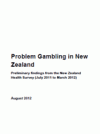This report presents preliminary findings on gambling in New Zealand based on nine months of data collection from the New Zealand Health Survey (NZHS) (July 2011 to March 2012).
These preliminary findings have been released to inform the Select Committee review on the Gambling (Gambling Harm Reduction) Amendment Bill and development of the Ministry’s 2013/14–2015/16 Service Plan for Preventing and Minimising Gambling Harm. This data is subject to change.
Key Results
Key preliminary findings include the following.
- The proportion of New Zealanders who take part in gambling activities declined between 2002/03 and 2011/12, the largest decrease occurring between 2006/07 and 2011/12.
- This decline occurred among all ethnic groups, the greatest decline evident among Māori.
- The majority of gamblers were recreational gamblers; only a small proportion of gamblers were at risk from their gambling.
- The decline in the proportion of the population who had gambled in the past year was primarily due to a reduction in recreational and low-risk gambling. By contrast there was no change in rates of participation by people with a moderate or high risk of gambling problems.
- Approximately one in forty people were negatively affected by other people’s gambling.

